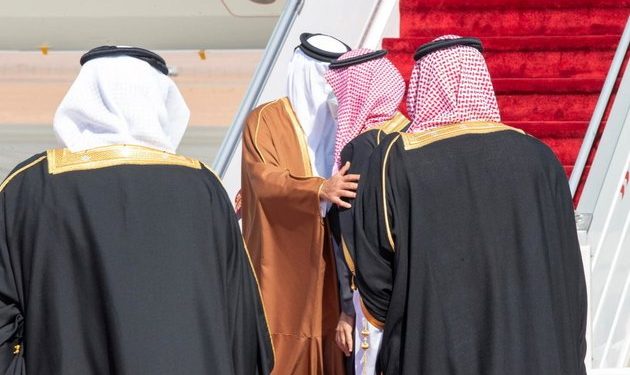- Qatar’s ruling emir arrived in Saudi Arabia for a Gulf summit and was greeted with an embrace by the kingdom’s crown prince on Tuesday.
- Qatar’s Emir Sheikh Tamim bin Hamad al-Thani was met in the historic city of Al-Ula by de facto Saudi ruler Crown Prince Mohammed bin Salman.
- The Qatari emir’s arrival at Al-Ula was broadcast live on Saudi state TV while the media in Qatar hailed the “warm” embrace ahead of a “landmark” Gulf Cooperation Council (GCC) summit.
RIYADH, Saudi Arabia – Qatar’s ruling emir arrived in Saudi Arabia for a Gulf summit and was greeted with an embrace by the kingdom’s crown prince on Tuesday, following an announcement that the kingdom would end its yearslong embargo on the tiny Gulf Arab state.
Qatar‘s Emir Sheikh Tamim bin Hamad al-Thani was met in the historic city of Al-Ula by de facto Saudi ruler Crown Prince Mohammed bin Salman. The two men, wearing face masks, embraced on the tarmac.
The Qatari emir’s arrival at Al-Ula was broadcast live on Saudi state TV while the media in Qatar hailed the “warm” embrace ahead of a “landmark” Gulf Cooperation Council (GCC) summit.
The meeting came a day after Kuwait, another GCC member, announced a Saudi decision to open its airspace and borders to Qatar following an embargo that began in mid-2017.
The diplomatic breakthrough came after a final push by the outgoing Trump administration and fellow Gulf state Kuwait to mediate an end to the crisis. It came just ahead of President-elect Joe Biden‘s inauguration as Riyadh braces for a new administration that is expected to take a firmer stance toward the kingdom.
Qatar’s only land border has been mostly closed since June mid-2017, when Saudi Arabia, Egypt, the United Arab Emirates and Bahrain launched a blockade against the small, but influential Persian Gulf country. The Saudi border, which Qatar relied on for the import of dairy products, construction materials and other goods, opened briefly during the past three years to allow Qataris into Saudi Arabia to perform the Islamic Hajj pilgrimage.
It was unclear what concessions Qatar had made regarding a shift in its policies.
The Qatari emir has only attended a GCC summit once – when it was hosted by Kuwait – since the blockade was launched. The following two summits were held in Saudi Arabia and he instead sent an envoy.
Kushner’s diplomatic shuffle
While the Saudi decision to end its embargo marks a key milestone toward resolving the Gulf spat, the path toward full reconciliation is far from guaranteed. The rift between Abu Dhabi and Doha has been deepest, with the UAE and Qatar at sharp ideological odds.
The UAE’s Minister of State for Foreign Affairs, Anwar Gargash, tweeted late Monday that his country was keen to restore Gulf unity. However, he cautioned: “We have more work to do and we are in the right direction.”
The annual summit is expected to also see some form of detente between Qatar and the UAE, Egypt and Bahrain.
The Saudi move toward reconciliation with Qatar comes just weeks after President Donald Trump’s advisor and son-in-law, Jared Kushner, visited the kingdom and Qatar to secure an end to the rift. Kushner has reportedly been invited to attend the signing ceremony in Al-Ula.
Normalisation with Qatar could buy Saudi Arabia time to strike compromises with the Biden administration on other issues, like its war in Yemen and potential US re-engagement with Iran, said Samuel Ramani, a non-resident fellow at the Gulf International Forum.
“Saudi Arabia could frame a partial detente, which allows Qatari civilian planes to fly over Saudi airspace and de-escalates the information war, as proof of ‘new thinking’ in Riyadh,” Ramani said ahead of the announcement.
Turkey, Iran, Muslim Brotherhood and other issues
At heart have been concerns that Qatar’s close relations with Turkey and Iran have undermined regional security. Egypt and the UAE view Qatar and Turkey’s support of the Muslim Brotherhood as a security threat and have deemed the group a terrorist organization. Saudi Arabia and Bahrain are primarily concerned with Qatar’s close ties with regional foe Iran.
Those simmering tensions came to a boil in the summer of 2017, when the four countries announced their stunning blockade on Qatar and cut all transport and diplomatic links with it.
The move separated families who’d intermarried with Qataris and ended years of visa-free travel for Qataris in par of the Gulf. It also pushed Qatar diplomatically closer to Turkey and Iran, which both rushed to Doha’s aid with food and medical supplies in the first days of the embargo. Patriotic fervor swept through Qatar in support of Sheikh Tamim’s resolve.
Gas-rich Qatar also took an economic hit from the blockade, and its national airline was forced to take longer and more costly routes. It was unclear how the blockade would impact its ability to host the 2022 FIFA World Cup.
Demands on Qatar
The blockading countries made a list of demands on Qatar that included shuttering its flagship Al-Jazeera news network and terminating Turkish military presence in Qatar, which is also home to a major US military base. Qatar has outright rejected the demands, and has denied that its support of Islamist groups indicates support for violent extremists.
State-linked media in the UAE and Qatar lobbed vicious attacks back and forth. Qataris also alluded to the UAE being behind the hacking of its state-run news agency in 2017, while the UAE’s influential ambassador to Washington saw his emails subsequently hacked and leaked.
In a sign that hostilities continue to simmer, Qatar protested to the UN Security Council last month that Bahraini fighter jets “violated” Qatari airspace in early December. Bahrain, meanwhile, has accused the Qatari coast guard of arbitrarily detaining dozens of Bahraini fishing vessels.
Ahmed Hafez, the spokesman for Egypt’s Foreign Ministry, said last week that Cairo supports efforts to reach a resolution that respects “non-interference in internal affairs” in an apparent reference to Qatar’s backing of the Muslim Brotherhood. The conflict in Libya is also a contentious issue, with Egypt and the UAE supporting militias fighting a Tripoli-based bloc backed by Turkey and Qatar.
(FRANCE 24 with AP and REUTERS)








Hey! Do you know if they make any plugins to assist with SEO?
I’m trying to get my blog to rank for some targeted keywords
but I’m not seeing very good success. If you know of any
please share. Many thanks! You can read similar article here: Eco blankets
Good day! Do you know if they make any plugins to help
with SEO? I’m trying to get my website to rank for some targeted keywords but I’m not
seeing very good results. If you know of any please
share. Kudos! I saw similar article here:
Code of destiny
I’m really impressed together with your writing talents and also with the structure on your blog. Is that this a paid theme or did you customize it your self? Anyway stay up the nice quality writing, it’s uncommon to look a nice blog like this one nowadays. I like diplomaticinfo.com ! I made: Stan Store
I am extremely inspired together with your writing skills and also with the structure in your blog. Is that this a paid subject or did you modify it your self? Either way keep up the nice high quality writing, it’s rare to peer a great blog like this one today. I like diplomaticinfo.com ! My is: LinkedIN Scraping